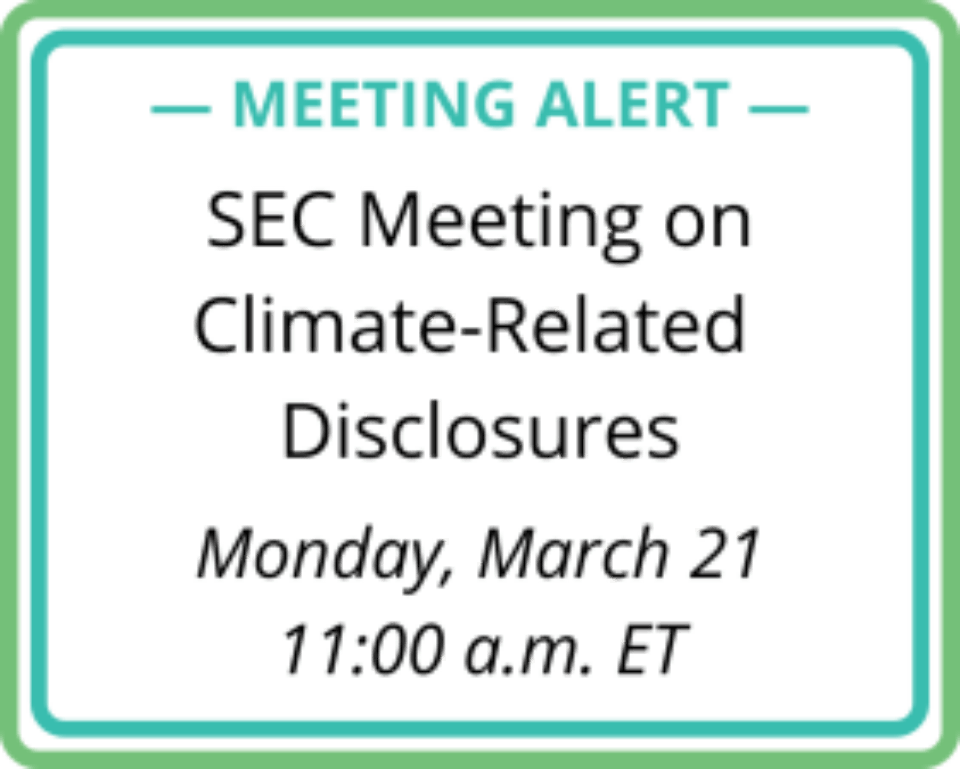Okay, So We Gonna Talk About Bru...Climate Risk?*
Bethany Davis Noll (Executive Director) / March 10, 2022

In a series of discussions last month, experts, advocates, regulators, and analysts took a deep dive into the data that is currently available about climate risk, the way that data is being used now, and the wide need for more data and information.
“We need to ensure that data and analysis gathered from scientists and the private sector doesn’t just sit on the shelf. It needs to be in the hands of policy makers, investors, and most importantly, local communities that are already bearing the brunt of this all.”
– Massachusetts Attorney General Maura Healey
As the speakers explained, the data to assess physical risk from climate change is available from places like Woodwell Climate Research Center and First Street. But decisionmakers are still too focused on using this information as a reactionary tool rather than for long-term planning.
Demand for information about near-term climate impacts has skyrocketed. Yet, most location-specific datasets and climate projections are expensive and our of reach of small municipalities and organizations. What we need is a National Climate Service — a centralized hub of national climate information and adaptation support—to provide this public good.
– Madison Condon, Associate Professor, Boston University School of Law
In addition, while many publicly listed companies are already measuring and disclosing their emissions and climate risks, they need a process for disclosing the information that is more transparent, accessible, and streamlined.
To that end, the Securities and Exchange Commission has been exploring new disclosure rules to provide investors and other market players information about climate impacts that affect their bottom lines. The Commission will consider proposing changes at a meeting next week. State-level regulators also have tools to mandate corporate governance structures and disclosure rules that could help steer investment away from companies that are ill-prepared for climate change and toward much-needed investment in climate solutions.

Meanwhile, the data is needed urgently at the local level. Climate change has already caused irreversible damage in many places. Robin Bronen, Executive Director of the Alaska Institute for Justice, explained that Alaska Native villages and communities have had to make the impossibly difficult decision to relocate from their homes in the face of catastrophic erosion. Extreme weather events and other effects of climate change are being felt across the country as illustrated by Dr. Jennifer Jurado’s description of adaptation work being done in Broward County, Florida.
Basic data and measurement are the bare minimum to cure an illness. … We still have to do the work with that information and that means mandates for climate solutions. So there are three steps, there’s the measurement, there’s the disclosure, and then there’s a reduction. Without the third step, we are still on team don’t look up.
– Marilyn Waite, Managing Director, Climate Finance Fund
“Resilience is not fair, climate risk is not fair, disaster recovery is not fair, and all of these systems of dealing with climate change solutions are actually furthering climate injustice,” explained Heather McTeer Toney, Environmental Defense Fund’s Vice President of Community Engagement and former mayor of Greenville, Mississippi. She then urged the audience to truly listen to the science and “community experts in order create a more efficient and equitable process that saves our economy, our ecosystems, and our lives at the same time.”
What did this series show us? Climate impacts are expensive and exacerbate inequities. Banks are already requiring companies to stress test their assets against climate scenarios. Many companies are already disclosing their emissions. The data needed to show local impacts exists. The business case for resilience also exists. There is much work to do.
To read more about the topics covered, see our list of resources here.
* “All of You.” ENCANTO (Jared Bush, Byron Howard dir., 2021).
This page was updated on January 22, 2024 to better meet our accessibility standards. To see the page as it was initially published, click here.
